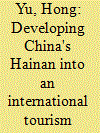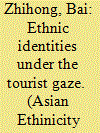| Srl | Item |
| 1 |
ID:
105210


|
|
|
|
|
| Publication |
2011.
|
| Summary/Abstract |
The Chinese central government has identified tourism as an important means of stimulating domestic consumption and transforming China's economic development pattern from investment and export-driven to consumption-led. According to the government's new plan released in 2009, development of Hainan as an International Tourism Destination has been upgraded to a national strategy. By critically discussing the western theories on the policy-making process, this paper intends to adopt the case study of Hainan to specifically analyze its state-initiated plan for regional tourism development. Hainan is the only province in China to clearly be identified by the government for the development of its tourism into a mainstay industry. It is intended to become a test zone for China's tourism reform and innovation and take a lead in development of tourism and associated industries. The government believes that the tourism sector is a key means of boosting regional economic development and reducing regional disparities between Hainan and the prosperous eastern provinces. Nevertheless, Hainan still faces serious obstacles to its goal of becoming a top Asia Pacific holiday destination. A lack of skilled personnel, backward transport network and poor service standards in tourism and hospitality are persistent and pressing issues. The plan for developing Hainan into an international tourism destination is unlikely to become a reality in the near future.
|
|
|
|
|
|
|
|
|
|
|
|
|
|
|
|
| 2 |
ID:
119920


|
|
|
|
|
| Publication |
2013.
|
| Summary/Abstract |
This research reports on empirical findings of remote Pitcairn Island, the last remaining British Overseas Territory in the Pacific. It uses a qualitative methodology to discuss the island's potential for tourism development while recognising the issues and challenges faced by many small island developing states. However, as a sub-national island jurisdiction Pitcairn presents a number of issues unique to its temporal socio-political development and its centre periphery relationship with the metropole. The concept 'decolonising without disengaging' is posited to argue sub-national island jurisdictions are places/spaces of innovative, creative and differentiated development processes that offer interesting departures from the conventional realms of sustainable discourse and island development. This concept is posited as a strategy of empowerment whereby autonomy without sovereignty does not necessarily hinder the development of tourism industries.
|
|
|
|
|
|
|
|
|
|
|
|
|
|
|
|
| 3 |
ID:
079635


|
|
|
|
|
| Publication |
2007.
|
| Summary/Abstract |
This paper examines the construction of Bai ethnicity and Bai identity on the tourist market in Dali, Dali Bai Autonomous Prefecture, Yunnan, China. Focusing on how the social landscape of Dali has changed in response to the development of tourism, this paper explores how Bai ethnicity is advocated as a product loaded with potential economic values. The author discovers that 'commerce of authenticity' (T. Oakes, Tourism and modernity in China. London, Routledge, 1998), and different forms of ethnicity and artefacts promoted in the tourist market have not drowned out the sense of being ethnically Bai. Instead, the tourist industry has become a daily reminder of ethnicity to both insiders and outsiders by making people more self-conscious and reflexive about the 'cultural stuff' that they may have previously taken for granted, or may have left unattended. This paper demonstrates how locals actively appropriate state-defined categories and reshape them into the repertoire they desire
|
|
|
|
|
|
|
|
|
|
|
|
|
|
|
|
| 4 |
ID:
175445


|
|
|
|
|
| Summary/Abstract |
The article explores the concept of neo-nomadic culture as a territorial brand for ‘authentic’ Kazakhstan’s tourism development. Using a qualitative methodology based on two case studies of eco-cultural tours, the article examines stakeholders’ perceptions of authenticity of several heritage dimensions of nomadic culture and how these perceptions intersect with the notion of ‘terroir’. The article argues that constructing ‘authentic’ tourism products and experiences based on contemporary Kazakhstani nomadic culture and traditions enables local stakeholders to reaffirm their territorial and cultural identities in the post-Soviet era and fosters international recognition of authentic eco-cultural tourism practices among similar tourism destinations in Central Asia.
|
|
|
|
|
|
|
|
|
|
|
|
|
|
|
|